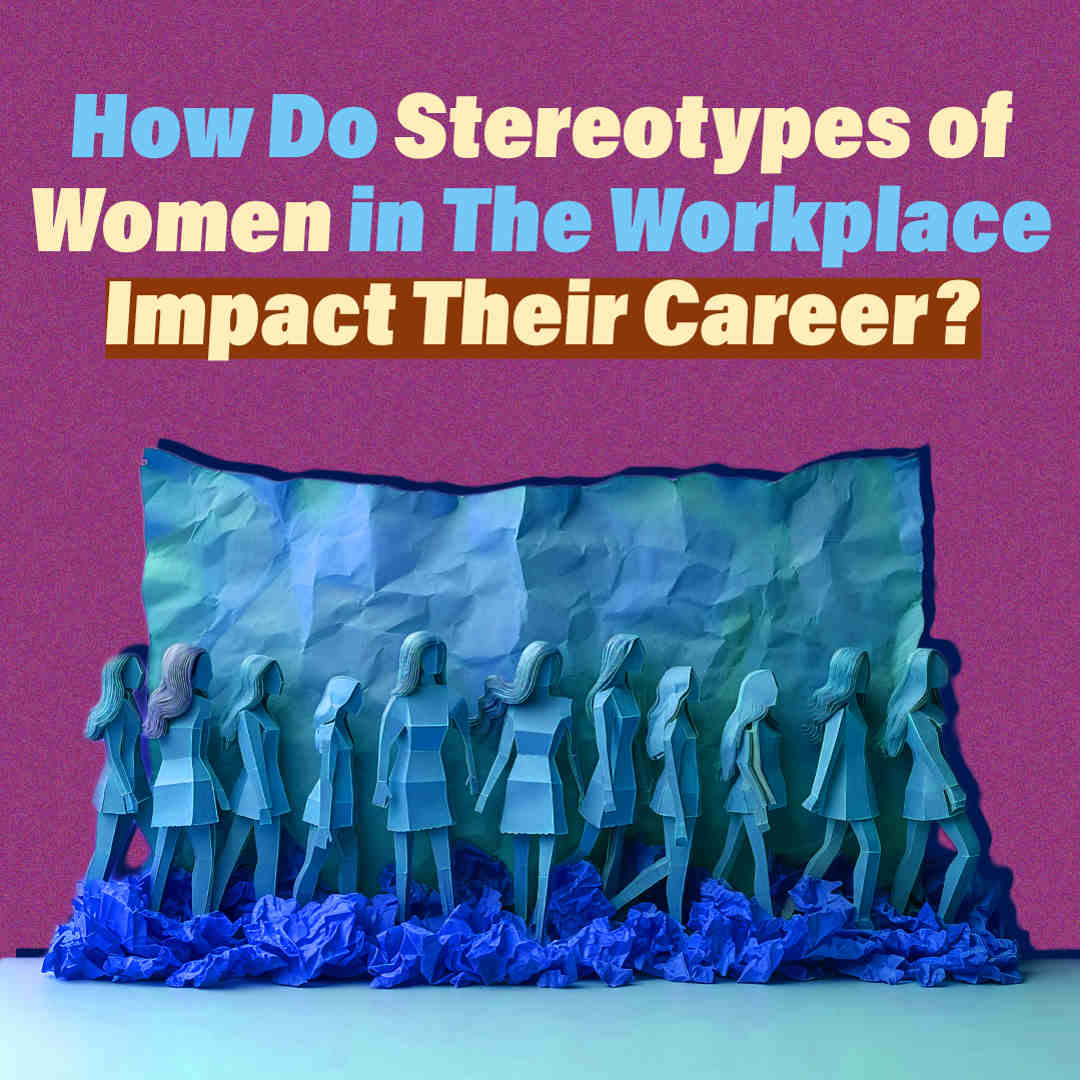CATEGORIES
#Careers #Women Empowerment #Work CultureOverview:
- Traditional patriarchal mindsets play a role in internalizing stereotypes of women which spreads into the workplace.
- Stereotypes about women in the workplace have detrimental effects both on their personal and professional lives.
- Stereotypes of women in the workplace create minimal opportunities for career advancement.
- Appropriate workplace measures must be put in place to unlearn these stereotypes for a more equitable workplace.
Stereotypes regarding gender have been a generally big issue our society faces through time. Traditional patriarchal mindsets and biases play a role in internalizing them into daily lives, which eventually spreads women discrimination in the workplace. In regards to female professionals, stereotypes about women in the workplace have detrimental effects both on their personal and professional lives. It affects them mentally, even going as far as impacting their self-perception, career development opportunities, and productivity. Looking to the future, some significant changes must be made to see a shift in these patterns.

Stereotypes of Women in the Workplace: The Detrimental Impacts
“Women are too emotional to lead” is probably one of the most common stereotypes against female professionals that deters them from being regarded equally as men. We have heard it multiple times before, or maybe you have been subjected to that view in the past. Whether it is conscious or unconscious bias, think about how that makes you feel and how other women would feel about it.
Statements like these, which generalize women as a group who are less capable than men, have an impact on their careers. Women are disregarded, their opinions unheard, and their contributions cast aside, even when they hold board seats. Consequently, after having been ignored for their input in the workplace, it asserts a variety of different detrimental effects on women’s professional lives.
Mental Pressure on Female Professionals
Behavior in the office that reinforces stereotypes of women in the workplace has been found to demotivate female professionals. Having to experience high levels of pressure and stress to be recognized for their efforts, women struggle mentally to keep up with their jobs.
Stereotypes against female professionals in a corporate setting have made them less visible than male professionals. They have to speak up twice as loud to be heard, and their ideas have to be something truly new and innovative to be recognized– if someone else doesn’t take credit for it first.
Due to stereotypes of women in the workplace that question their performance, female professionals have to prove themselves continuously. This asserts stress and mental pressure on women, especially in male-dominated industries. When having to work twice the amount and give twice as much time as their male counterparts, women experience mental burnout and overstress much faster.

Minimal Opportunities for Career Development
As a consequence of the mental pressure female professionals experience, their aspirations to climb up the corporate ladder are affected. Their ambitions end up being damaged when it comes to advancing their careers.
In hiring processes, women gain a disadvantage in the process of screening potential leaders or managerial positions. In a study conducted through a survey, most people believe that female leaders are more likely to involve emotions in their decision-making processes. This, in turn, makes employers less likely to hire women for leadership positions.
Having internalized these stereotypes about women in the workplace, female workers themselves will start to question their capabilities. Studies show that women prefer not to apply for a promotion or take on leadership roles, as they fear they don’t have what it takes to play the part.
Internalized Self-View of Patriarchal Beliefs
A lot of women are born and raised in families that adopt traditional patriarchal beliefs. Beliefs that women are caretakers and men are breadwinners impact the way they perceive themselves and their careers. Additionally, having been exposed to the common stereotypes about women in the workplace, female professionals would subconsciously internalize these beliefs for themselves.
These attitudes create a male-dominated working environment that strengthens the long-standing work culture of normalizing male managers. Patriarchal beliefs have women idealizing men in managerial positions, casting themselves aside for possible leadership roles.
As a result, women are overlooked as potential candidates for leadership positions. Female professionals have fewer opportunities for a promotion, having to deal with low compensation for their work and experiences. Eventually, this would cause women to switch jobs, move industries, or quit working entirely. Thus, repeating the cycle of harmful gender stereotypes, reinforcing it, and internalizing it as a society.
Moving Past Stereotypes of Women in the Workplace
While women and men do have different roles in society, the idea of gender parity becomes the ideal we strive for. Gender parity means having equal contributions from both men and women in various aspects of life. In the workplace, our focus on gender parity becomes the economic factor. Female professionals struggle daily to meet the expectations placed on them due to stereotypes of women in the workplace. They are expected to behave a certain way, are projected to have negative ‘emotional’ tendencies, and lack professionalism. However, that is far from the truth. Hence, this is why our main focus should be on how to support women in the workplace.
Changing these traditional beliefs that are ingrained in culture within the professional landscape is something that takes a collaborative effort. For there to be a positive change, both men and women must work together to understand that these stereotypes are a thing of the past. Both men and women should be advocates for gender parity, stand for gender rights, and support women’s choices.

Where do we Start Addressing the Issue of Gender Inequality?
When we expect positive change and progress in the fight against gender inequality, it starts from an individual level. Socio-cultural factors hold a crucial role in reducing stereotypes applied against women in the workplace. We can start by unlearning the traditional beliefs insisted onto us from a young age, and understand the reality of the professional landscape. Both men and women have valuable skill sets in the workplace, and gender does not determine one’s professionalism or capabilities.
Gaining awareness and understanding of how untrue these stereotypes of women in the workplace are changes the behavior within professional landscapes. Because when people start to realize where the negative stereotypes come from, and how data suggests otherwise, the biases lose their power.
Steps Toward Erasing Stereotypes of Women in the Workplace
Organizationally, there are steps and measures to reduce and erase gender biases. A key approach is implementing a gender-neutral recruitment process that hides the candidates’ gender from the assessor. This ensures a focus on skills, minimizes recruitment bias, and enables hiring decisions based purely on merit. Diversity and inclusion are essential for fostering an equitable workplace.
Conclusion
Stereotypes of women in the workplace affect them negatively in their careers. Other than limiting their opportunities for career advancement, it also affects their mental well-being. In order to expect change, we must first start to recognize the unconscious gender bias we might have against both men and women. Organizations need to be more inclusive of female professionals and implement measures to erase gender biases in the workplace.
FAQs:
What Are the Effects of Stereotypes of Women in the Workplace?
Stereotypes of women in the workplace exert mental pressure on women to work twice as hard as others just to prove themselves. It gives them fewer opportunities for career advancement, and eventually leads to internalized patriarchal views of themselves.
How Do We Address Negative Stereotypes of Women in the Workplace?
Companies can implement training programs for employees to unlearn negative stereotypes against women in the workplace. Additionally, companies can implement a strict policy against discrimination, and establish proper criteria for promotion.
How Do Stereotypes of Women in the Workplace Impact Their Careers?
Female professionals have fewer opportunities for a promotion, having to deal with low compensation for their work and experiences. Eventually, this would cause women to switch jobs, move industries, or quit working entirely.
How Does Gender Bias Affect Female Professionals?
Stereotypes against female professionals in a corporate setting have made them less visible than male professionals. This demotivates female professionals and thus gives them fewer opportunities for career advancement.


